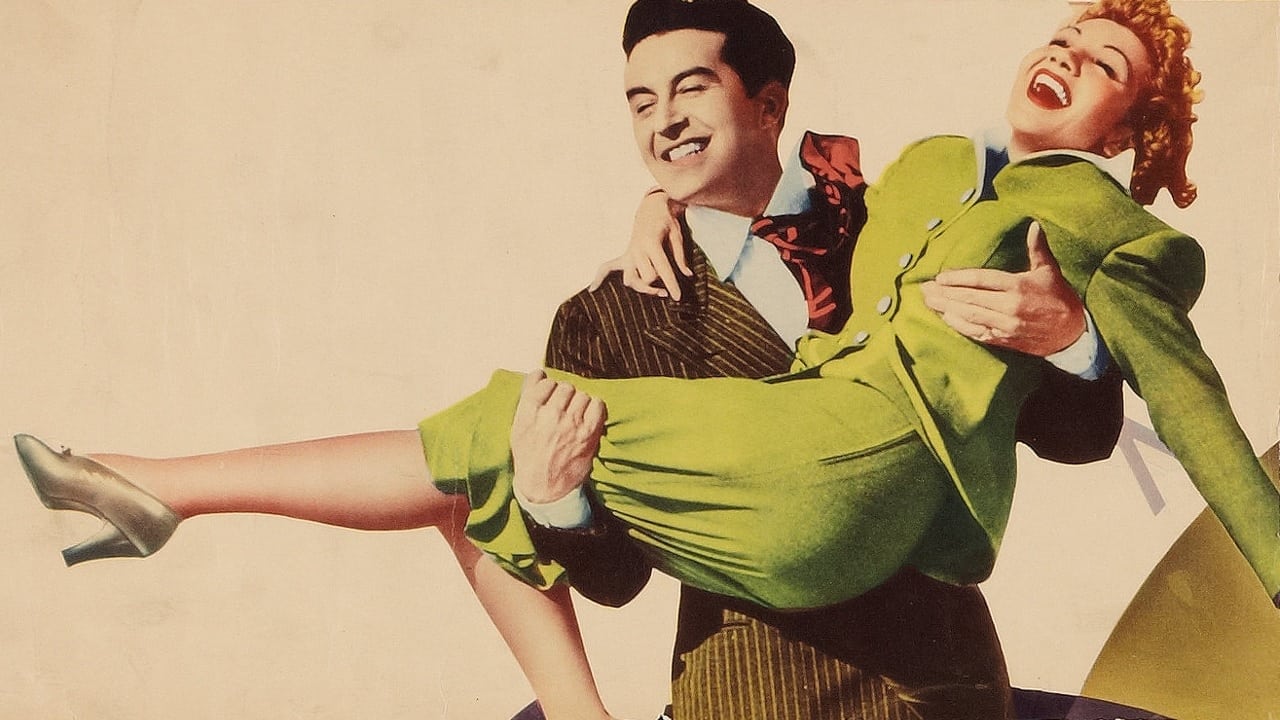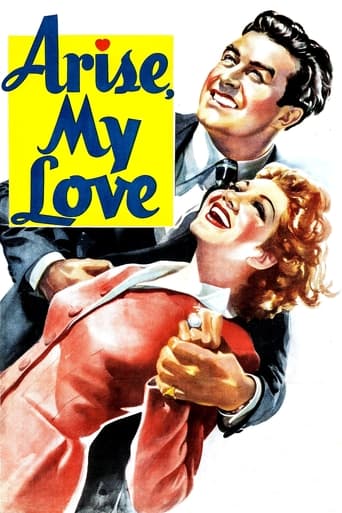

terrible... so disappointed.
... View MoreClever, believable, and super fun to watch. It totally has replay value.
... View MoreThe movie is wonderful and true, an act of love in all its contradictions and complexity
... View MoreOne of the film's great tricks is that, for a time, you think it will go down a rabbit hole of unrealistic glorification.
... View MoreDirector: MITCHELL LEISEN. Screenplay: Charles Brackett, Billy Wilder. Adapta¬tion: Jacques Thery. Original story: Ben¬jamin Glazer, John S. Toldy. Photographer: Charles Lang, Jr. Film editor: Doane Harrison. Art directors: Hans Dreier and Robert Usher. Set deco¬rations: A.E. Freudemann. Costumes: Travis Banton. Music composed and directed by Victor Young. Producer: Arthur Hornblow, Jr.Copyright 8 November 1940 by Paramount Pictures Inc. New York opening at the Para¬mount: 16 October 1940. U.S. release: 8 November 1940. Australian release: 30 Janu¬ary 1941. 12 reels. 9,915 feet. 110 minutes.SYNOPSIS: Girl reporter rescues rebel leader from Spanish prison - exciting, ingeniously cliff-hanging stuff - but, alas for the good of the rest of the picture, they fall in love.NOTES: The Academy of Motion Picture Arts and Sciences handed their Annual Award to Benjamin Glazer and John S. Toldy for Best Original Story (defeating Comrade X, Edison the Man, My Favorite Wife, and The Westerner). Also nominated for The Academy of Motion Picture Arts and Sciences Awards for black-and-white photography (won by George Barnes for Rebecca); black-and-white art direction (won by Pride and Prejudice); Best Music Score (won by Alfred Newman for Tin Pan Alley).COMMENT: Made by the same team responsible for Midnight a year earlier, but this time the Brackett-Wilder script is the weakest link. Despite a really huge cast with some magnificent players, after a very exciting first reel, this movie goes slowly but steadily downhill until all we are left with of interest is Walter Abel periodically exclaiming, "I'm not happy!" But that first reel is must-see material. Frank Puglia is terrific!
... View More"Arise, My Love" is billed as a comedy-romance and drama. But, this film is as much a war story for its time and setting. A blossoming love is the core of the film, around which a myriad of small adventures and escapades coalesce. Indeed, the setting of early wartime Europe provides the basis for the love story. The humor is peppered throughout the film, mostly with its main characters. And like other films of this period – from the early months before to the start of WW II, this movie gives a look at the news media of the day and the American news sources in Europe. Claudette Colbert and Ray Milland are excellent in their roles of Augusta Nash and Tom Martin. "Gusto" Nash gives another side plot view of a woman striving for a professional career above all else. Walter Abel is excellent as the Associated News Agency European chief, Phillips, and adds to much of the humor. Colbert and Milland work well, and have a good chemistry that makes their roles believable as they segue from the humorous to the serious and a deep love. The rest of the supporting cast are fine, but beyond Phillips, few other roles have much substance. This is a film that is heavily weighted with the two leads and leading supporting role of Abel's. The production values and direction are very good in handling a fairly complex script with so many deviations and diversions. The script is mostly very good, but toward the end it skips over a chapter in which Tom is injured while flying against the Germans in Norway. The film has a lot of action, and touches on several historical events, albeit with the fictional characters involved. Nash rescues Martin from a Spanish firing squad in a clever plot. The two commandeer a plane on the ground and flee pursuing fighter planes. Later, they are among the survivors of the British passenger ship, Athenia. A German submarine torpedoed the ship off the Coast of Ireland on Sept. 2, 1939. It was the first hostile action on the seas by Germany, even before the official start of WW II. The scenes filmed of the rescued lifeboats are quite dramatic on the Irish coastline. Tom and Gusto were on the ship after the U.S. government urged Americans to return home following Germany's conquest of France. Deeply in love, the couple plan to marry and contribute to the war effort back home. Instead of flying fighter planes and reporting the war headlines, they will take safer jobs where they can be together in Cleveland. Onboard the Athenia, they toasted farewell to their former selves – fighter pilot Tom Martin, and big name reporter Gusto Nash, and tossed the champagne glasses overboard. Now, on the beach after their rescue, as they decide to stay, Gusto says, "God knew better. He threw us right back at them."This movie premiered on Oct 17, 1940, in America – more than a year before the U.S. would enter World War II. It covers just a short period from after the Spanish Civil War (April 1939) through the fall of France in May of 1940. It's one of the few American films made well before the U.S. entered WW II, and it doesn't hold back on the criticism of Nazi Germany, expressed mostly by Milland's character, Tom Martin. With it's bouncing around from one place and event to another, "Arise, My Love" may lose some viewers. Those who know a little history of the time will find the details more interesting. But, history knowledge or not, most viewers should enjoy this film. It has adventure, humor, romance, and the early stages of war. The title for the film comes from the Bible. Tom tells Gusto that he says this short prayer whenever he takes a plane up. It comes from Song of Solomon, Verse 2:13b: "Arise, my love, my fair one, and come away."
... View MoreThis film is pretty good but oddly uneven. The script (which Charles Brackett and Billy Wilder both worked on) is about the adventures and experiences of soldier-of-fortune Ray Milland and reporter Claudette Colbert across western Europe from Spain to Germany and then to England. Colbert is working for an American syndicate out of Paris that is headed by Walter Abel. She goes to Spain, where the Spanish Civil War is ending with a Fascist victory. Milland is going to be executed (he's been fighting for the Republic), and Colbert tells the prison governor (George Zucco) that she is married to Milland. She is allowed to see Milland, and helps spirit him out of the prison for the sake of the interview and scoop. They get to France, and Milland proceeds to romance and slowly win Colbert. The rest of the film is done against the background of the worsening international crisis, seen first hand by our hero and heroine. Colbert does not like the Nazis, but she is slower on the realization that they are not limited in their goals but determined to spread control over as many peoples as possible. Milland (when not trying to break down Colbert's "friends only" point of view) is showing her the ropes of the real German led threat to Europe and the globe. The unevenness (despite having Wilder and Brackett working on the screenplay) is due to the nature of the light banter between the romantic leads, and the growing threat they observe. It is not a glaring weakness, but it seems to split the film in half at times.Sometimes it has a belated effectiveness in carrying out the warning of the movie. Abel is all business and hectic confusion (Esther Dale, as his secretary, helps keep him directed to his purposes) in sending Colbert to her jobs and getting her stories back to the U.S. At one point we find Milland and Colbert in Paris, with the latter doing his best to get Colbert to loosen up - taking her to Maxim's and other romantic nightspots in that city. It does eventually wear down her resistance to him. But late in the film it is June 1940, and Abel is on hand to see the entrance of the victorious Nazis into Paris. He has a very good moment when his business viewpoint dissipates in shock as he realizes the "city of lights" is in the hands of these modern barbarians. His comments at that moment make us think back to the brighter Paris we saw earlier in the sequences at Maxim's.*(*A curious sidelight: Although from different studios, the events of that June day play a role in Paramount's ARISE, MY LOVE, and Warner's CASABLANCA: Bogart and Dooley Wilson flee Paris (to avoid arrest from the Germans) by train, and Bergman deserts Bogart (to return to the wounded Paul Henreid) at the same time that Abel is watching the arrival of the same German troops.)Despite the unevenness the film is worth seeing. It has many good moments in it (including an unexpectedly bumbling Zucco - his usual evil control of events thwarted by his act of kindness to the pretty Colbert). It is also, as far as I know, the only movie to mention a forgotten war crime of the opening of the war: the torpedoing and sinking of the steamer Athenia off Ireland with loss of life. The incident (in September 1939) is not as recalled as the similar Lusitania incident of 1915 in the same waters because the losses were not as huge (fortunately). Oddly enough the Nazis were quick to be aware of the similarity, and the Goebbels propaganda machine cranked up a story that the British were responsible, not the Germans. Nobody believed it then or since.Despite it's somewhat split personality the film gets an "8" out of "10".
... View MoreDefinitely in my all time top 10. The Milland/Colbert pairing is fantastic, there is wonderful chemistry between the two stars but it is Colbert who as the independent career woman Augusta Nash launched me on my love of 1930's/1940's films and I would recommend this as a fabulous example of what films of that era have to offer a modern audience. The opening sequences set the adventurous and romantic tone of the movie. The scenes in Maxim's and the in the horse drawn carriage on Monmartre are wonderfully romantic as Tom (Milland) plots to overcome Augusta's business only attitude. A fabulous film which gets home the patriotic message needed as WWII commenced without ever overwhelming the wonderful adventurous story.
... View More